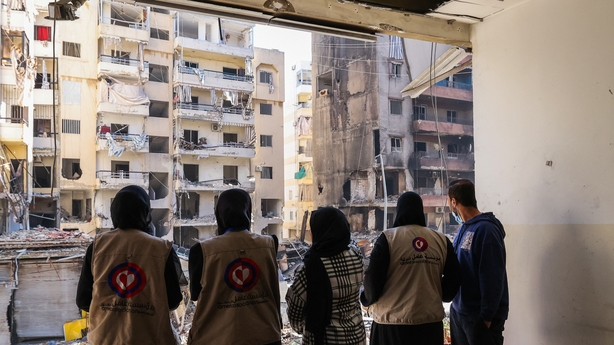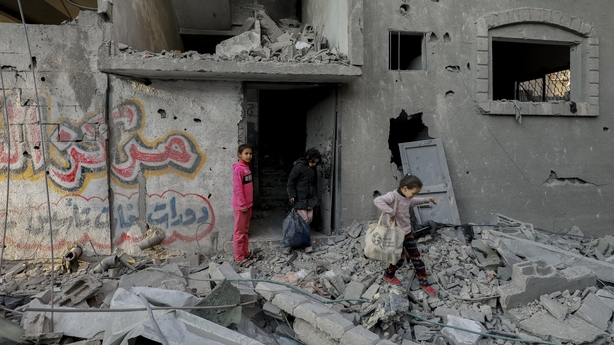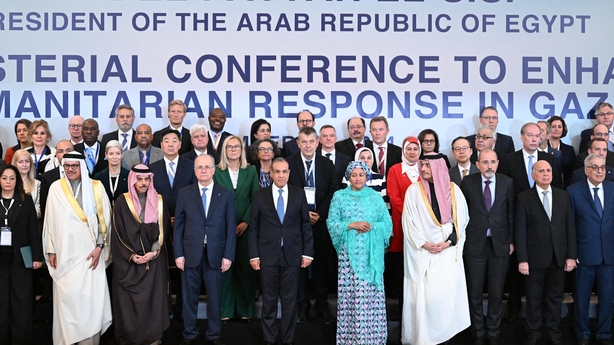Israel said it hit dozens of Hezbollah targets in strikes on Lebanon after vowing retaliation for an attack claimed by Hezbollah, the militant group's first since a fragile ceasefire began last week.
Both Israel and Hezbollah faced accusations of breaching the truce, which took effect on Wednesday to end a war that killed thousands of people in Lebanon and sparked mass displacements on both sides of the border.
The Israeli military in a statement said it "struck Hezbollah terrorists, dozens of launchers, and terrorist infrastructure throughout Lebanon".
"Israel demands that the relevant parties in Lebanon fulfil their responsibilities and prevent Hezbollah's hostile activity," the statement said.
Earlier, Hezbollah said it had launched an attack targeting an Israeli position in "the occupied hills of Kfar Shouba", in a disputed part of the border area between Israel and Lebanon.
Israel's military said Hezbollah had launched two projectiles towards one of its posts in the area of Har Dov, Israel's term for the disputed Shebaa Farms.

After that attack, Israeli Prime Minister Benjamin Netanyahu accused Hezbollah of a "serious violation" and vowed to "respond forcefully".
"We are determined to uphold the ceasefire and respond to any violation by Hezbollah, no matter how minor or serious," he said.
Israeli Defence Minister Israel Katz also vowed a "harsh response".
Shortly afterwards, the Israeli military said it was "striking terror targets in Lebanon".
Lebanon's official National News Agency reported strikes on areas of south Lebanon, where Hezbollah has long held sway, that are located around 20 kilometres from the border with Israel.
'Aggressive actions'
Earlier in the day, Lebanon's powerful parliament speaker Nabih Berri had accused Israel of violating the ceasefire.
"The aggressive actions carried out by Israeli occupation forces... represent a flagrant violation of the terms of the ceasefire agreement," said Mr Berri, who helped mediate the truce on behalf of ally Hezbollah.
The fighting escalated after Israel moved its focus from Gaza to Lebanon in September to secure its northern border from Hezbollah attacks, dealing the Iran-backed Shiite Muslim movement a series of stunning blows.
Under the deal, Hezbollah must withdraw its fighters from areas south of the river, and dismantle its military infrastructure in the south.
As part of the agreement, the Lebanese army and United Nations peacekeepers will deploy in southern Lebanon as the Israeli army withdraws over a period of 60 days.
'Threats'
A committee involving France, UN peacekeepers, Israel, Lebanon and chaired by the United States is tasked with maintaining communication between the various parties and ensuring violations are identified and dealt with to avoid any escalation.
"We ask the technical committee formed to monitor the implementation of this agreement where it stands on ongoing violations... that have exceeded 54 breaches," Berri added, urging it to "oblige Israel to stop its violations and withdraw from territories it occupies".

The United States said it believed that a ceasefire was still holding in Lebanon and that it was looking at potential violations.
Israel escalated its campaign against Hezbollah in late September after nearly a year of cross-border exchanges launched by the militant group in support of its Palestinian ally Hamas and its 7 October 2023 attack on Israel.
Earlier, Lebanon's health ministry said an Israeli strike killed one person in the country's south, while the Lebanese army said an Israeli drone wounded a soldier in the east.
Israel's military said it was "aware of reports regarding a soldier from the Lebanese military who was injured in one of the strikes and the incident is under investigation".
The army said it was responding to "several acts by Hezbollah in Lebanon that posed a threat to Israeli civilians in violation of the understandings between Israel and Lebanon".
Gaza has highest number of children amputees - UN
UN Secretary-General Antonio Guterres has said that Gaza now has "the highest number of children amputees per capita anywhere in the world", with "many losing limbs and undergoing surgeries without even anesthesia".
In remarks read out on his behalf at a Cairo conference aimed at increasing humanitarian aid, Mr Guterres urged the international community to "build a foundation for sustainable peace in Gaza and across the Middle East".
The UN Chief said the situation in war-torn Gaza was "appalling and apocalyptic", warning conditions faced by Palestinians in the territory may amount to the "gravest international crimes".
The war in Gaza broke out when Palestinian militant group Hamas attacked southern Israel on 7 October 2023, resulting in 1,208 deaths, mostly civilians, according to an AFP tally of Israeli official figures.
Israel's retaliatory campaign has killed 44,446 people in Gaza according to its health ministry. The toll includes 37 deaths in the past 24 hours.
Mr Guterres highlighted the devastating toll of the conflict and the urgent need for international action.
"Malnutrition is rampant... Famine is imminent.
"Meanwhile, the health system has collapsed," he said.
The secretary-general also criticised the severe restrictions on aid delivery, calling the current levels "grossly insufficient".
According to UNRWA's count, only 65 aid trucks per day had been able to enter Gaza this past month, compared to a pre-war average of 500.

International aid organisations have repeatedly raised alarm over the deteriorating conditions in Gaza, warning that civilians are on the brink of famine.
They have said aid shipments reaching Gaza now at their lowest since the start of the war.
Israel, which early in the conflict imposed a complete siege for a period on the Hamas-ruled territory, has blamed aid issues on what it says is the inability of relief organisations to handle and distribute large quantities of aid.
Mr Guterres said that the blockade of aid to Gaza "is not a crisis of logistics" but rather "a crisis of political will and of respect for fundamental principles of international humanitarian law".
UNRWA said all the attempts it made to deliver aid into northern Gaza had either been "denied" or "impeded" between 6 October and 25 November amid fierce fighting in the area.
Mr Guterres said UNRWA is an "irreplaceable lifeline for millions of Palestinians", adding that "if UNRWA is forced to close, the responsibility of replacing its vital services...would rest with Israel".
Israeli forces bombarded houses in overnight attacks in northern Gaza, killing at least 15 people in one of the buildings in the town of Beit Lahiya, Palestinian medics said.

